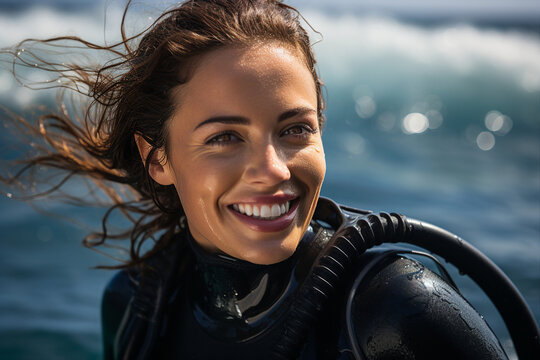PREGNANCY AND DIVING

Pregnancy and Diving: Implications and Advice
Pregnancy is the period during which a fetus develops inside a woman's uterus. A typical pregnancy lasts about 40 weeks, just over 9 months, from the last menstrual period to childbirth. To calculate a probable due date, determine the first day of the last menstrual period, count back three months from that date, and then add one year and seven days. This method, known as "Naegele's rule," is based on a typical 28-day cycle.
Implications for Diving
There is very limited scientific data available on diving during pregnancy, and much of the evidence is anecdotal. Laboratory studies are mainly confined to animal research, and results are conflicting. Some retrospective surveys exist but are limited by data interpretation.
Decompression Sickness (DCS)
One concern is the risk of decompression sickness (DCS) due to physiological changes during pregnancy. Fluid distribution in the body changes, which may affect the exchange of dissolved gases in the central circulation. This could theoretically increase the risk of nitrogen retention. Fluid retention during pregnancy can also lead to nasopharyngeal inflammation, causing congestion in the nose and ears, which might increase the risk of ear or sinus squeeze during diving.
Nausea and Motion Sickness
Pregnant women experiencing morning sickness might also deal with motion sickness from the rocking of a boat, leading to nausea and vomiting during a dive. This can be particularly problematic if the diver panics, exacerbating the situation.
General Risks and Recompression
Given the limited data and uncertainties about the effects of diving on a fetus, diving poses an increased risk during pregnancy. There have been cases of decompression sickness (DCS) during pregnancy, and if recompression treatment is needed, the effects on the fetus must be considered.
Additional Considerations
For pregnant women considering diving, the following points should be taken into account:
Medical Monitoring: Pregnant women should be under the supervision of a doctor, preferably one with experience in diving medicine.
Avoid Deep Dives: It is advisable to avoid deep dives and limit the duration of dives to minimize risks.
Diving Conditions: Diving in warm, clear waters may reduce stress and discomfort, improving the overall experience.
Proper Equipment: Ensure that diving equipment fits well and is comfortable, as pregnancy can affect the fit of standard equipment.
Conclusion
Diving during pregnancy presents several potential risks for both the mother and the fetus. Due to the lack of conclusive data and the severity of potential complications, many diving organizations and medical professionals recommend avoiding diving during pregnancy. Pregnant women interested in diving should seek advice from their healthcare provider and consider safer alternatives to enjoy the aquatic environment during this stage of life.
Pregnancy is the period during which a fetus develops inside a woman's uterus. A typical pregnancy lasts about 40 weeks, just over 9 months, from the last menstrual period to childbirth. To calculate a probable due date, determine the first day of the last menstrual period, count back three months from that date, and then add one year and seven days. This method, known as "Naegele's rule," is based on a typical 28-day cycle.
Implications for Diving
There is very limited scientific data available on diving during pregnancy, and much of the evidence is anecdotal. Laboratory studies are mainly confined to animal research, and results are conflicting. Some retrospective surveys exist but are limited by data interpretation.
Decompression Sickness (DCS)
One concern is the risk of decompression sickness (DCS) due to physiological changes during pregnancy. Fluid distribution in the body changes, which may affect the exchange of dissolved gases in the central circulation. This could theoretically increase the risk of nitrogen retention. Fluid retention during pregnancy can also lead to nasopharyngeal inflammation, causing congestion in the nose and ears, which might increase the risk of ear or sinus squeeze during diving.
Nausea and Motion Sickness
Pregnant women experiencing morning sickness might also deal with motion sickness from the rocking of a boat, leading to nausea and vomiting during a dive. This can be particularly problematic if the diver panics, exacerbating the situation.
General Risks and Recompression
Given the limited data and uncertainties about the effects of diving on a fetus, diving poses an increased risk during pregnancy. There have been cases of decompression sickness (DCS) during pregnancy, and if recompression treatment is needed, the effects on the fetus must be considered.
Additional Considerations
For pregnant women considering diving, the following points should be taken into account:
Medical Monitoring: Pregnant women should be under the supervision of a doctor, preferably one with experience in diving medicine.
Avoid Deep Dives: It is advisable to avoid deep dives and limit the duration of dives to minimize risks.
Diving Conditions: Diving in warm, clear waters may reduce stress and discomfort, improving the overall experience.
Proper Equipment: Ensure that diving equipment fits well and is comfortable, as pregnancy can affect the fit of standard equipment.
Conclusion
Diving during pregnancy presents several potential risks for both the mother and the fetus. Due to the lack of conclusive data and the severity of potential complications, many diving organizations and medical professionals recommend avoiding diving during pregnancy. Pregnant women interested in diving should seek advice from their healthcare provider and consider safer alternatives to enjoy the aquatic environment during this stage of life.
